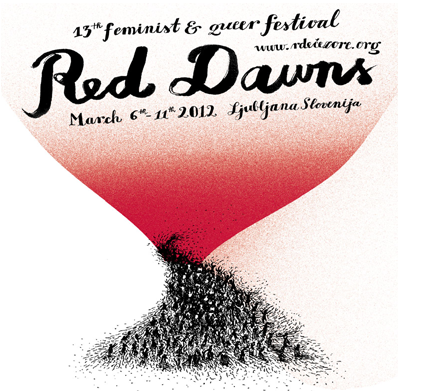 |
|||
|
|
Margareta Kern: GUESTures, 2011 Bring In Take Out Living Archive: Exhibition opening: Margareta Kern (UK): GUESTures Red Dawns and Bring In Take Out Living Archive presentExhibition opening and walk through with the artistMargareta Kern (UK): GUESTures
Margareta Kern’s solo exhibition GUESTures is a series of carefully staged performative archival interventions, envisioned as a ‘travelling archive’ which develops in a constant and complex dialogue with its audiences and with the ‘subjects’ of the artist’s parallel historical and ethnographic research into the mass labour migration of the workers from the socialist Yugoslavia to West Germany in the late 1960s. Within this broader context of Kern’s research, GUESTures has always been a project dedicated above all to the marginalised histories of women migrants, whose presence in the mass waves of labour migration from the former Yugoslavia for temporary work abroad remains extremely poorly documented. Combining private letters and personal album photographs marking the first years of women’s arrival to Germany and their lives at workers’ dorms, with the public archival footage of Willy Brandt’s (West Germany’s Foreign Minister) official visit to Belgrade in 1973, where he planted the cedar tree marking the labour trade agreement, GUESTures by their very structure remain an open space of investigation that emphasises the fragility of knowledge in which the relationship between document, memory and testimony is never a given. The central work in the exhibition, a double-screen video installation GUESTures | GOSTIkulacije was filmed with actress Adna Sablyich in artist’s studio in London. Inspired by the principles of political verbatim theatre, the script was based on audio-recordings of conversations between the migrant worker women in Berlin, and the artist. The resulting work both follows and subverts the impulse of the verbatim style to achieve a certain ‘ideal’ authenticity of expression through the use of documentary material. On two equally sized screens we can simultaneously follow two complexly linked contents; on one we see the artist creating the film-set, a kind of ‘fictional’ framework for the women’s stories, intervened occasionally by archival footage from German factories in which these women worked, whilst on the other we are solely focused on the actresses performance. The desired effect of the Brechtian ‘distancing’ of the narrative is additionally achieved through occasional subtle interventions, from significant pauses in actress’ interpretation of the text, to the sudden inclusion of the artist’s voice. Each part of the video is as much a portrait of the women interviewed, as it is an invitation to consider and question the role and relationship of voice, testimony, document/ary, performance and the historical imaginary. GUESTures materialises in their interaction with us, their visitors and temporary archivists, and only to the degree to which each one of us is ready to engage with the material they consist of, that is often activated through a physical gesture, however small, we have to make in order to access the material. This brings the project closer to the performativity of the notion of the archive itself, which, as Jacques Derrida reminds us in his book Archive Fever, is ‘at once the commencement and the commandment’, both a beginning and an order, both a place in which memory begins, and a patriarchal institution of memory in which some memories will be weaved into the fabric of the historical narrative, and others not. By activating the performative aspect of the archive, the artist also reminds us that the historical selectiveness is not simply the doing of some invisible authority outside our reach, but begins and ends with each one of us, with our individual gestures of acceptance and activating, or of refusal and forgetting, of some very simple human experiences that often change official histories and that are thus so often conveniently forgotten. “The ethics of wit(h)nessing, through which theorist Bracha Ettinger emphasises the multilayered and intertwined nature of the notions of experience, community, witnessing and memory, is one possible reading of the specificity of the aesthetic and ethical space opened up by GUESTures as an active political space. Wit(h)nessing is a po/etic boundary concept through which Ettinger strengthens the political potential of such border identities, where community is an affective notion which does not belong to the past only but is always created anew in the present moment, in which memory becomes possible only inasmuch as it is open to being affected by others, so that each, however incompatible experience can become part of a shared space of memory. This is the radical potential of art as an archive and a reminder of all that is unsaid and unheard in the discourse of history. By opening the potential for wit(h)nessing, the aesthetic space enables us to always question the dominant historiography and history anew, shifting it from the space of conflict into an affected space of compassion and of precarious knowledge.” — Dr. Branislava Kuburović, excerpts from an accompanying exhibition text GUESTures: Awakening the Space of Precarious Knowledge In English. No entrance fee. Margareta Kern‘s (UK) artistic practice engages with the social and political sphere through multi-layered and inter-disciplinary projects. Kern is interested in the relationship of performance, narrative and participation to documentary and experimental image making, as well as in the relationship of art and activism. Born in Yugoslavia in 1974, Kern migrated to London, where she graduated from the Goldsmiths College (BA Fine Art), and University College London (MA Visual and Material Culture/South East European Studies). Her work has been shown extensively including Tate Modern, Impressions Gallery Bradford, The Museum of Contemporary Art Budapest, SC Gallery Zagreb, Institute for Contemporary Interdisciplinary Art Bath, and Kurt-Kurt Gallery Berlin. Kern is currently a holder of Leverhulme artist-in-residence award at Durham University, UK. margaretakern.com |
MARCH 7TH 21:00 Kapelica Gallery, Kersnikova 4
Bring In Take Out Living Archive: Exhibition opening: Margareta Kern (UK): GUESTures
|
|